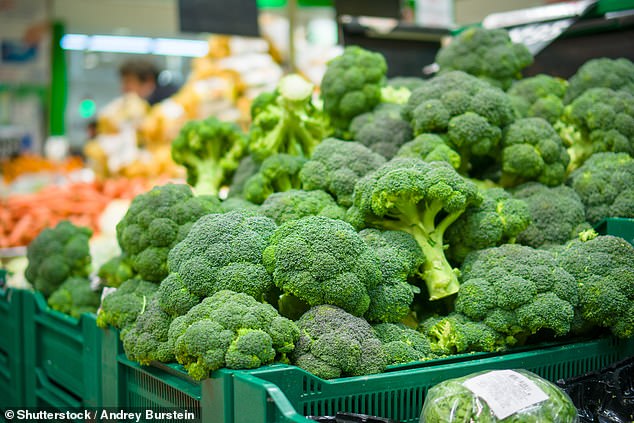[ad_1]
Broccoli juice shots are the latest wellness fad sweeping the world of elite athletics, and they’ve caught the attention of casual gym goers and joggers, too
Such shots have been spearheaded by brands like Nomio which launched a scientifically crafted concoction made of young broccoli shoots, lemon juice and sugar as an exercise and sporting supplement.
The elixir has certainly found its fans in the elite sporting world, including British long-distance runner and Olympian Emile Cairess, Danish cycling world champion Mads Pedersen and Swedish runner Andreas Almgren to name a few.
Developed by experts from the Karolinska Institutet and the Swedish School of Sport and Health in Stockholm the logic behind Nomio is that it contains an extreme level of substances called isothiocyanates (ITC).
These are organic compounds found in vegetables like broccoli that helps counteract the build-up of lactic acid, a natural waste product that accumulates in the muscles during exercise.
So, by ingesting a dose of ITCs before exercise an athlete or fitness enthusiast can push their body harder for longer.
The makers Nomio also say ITC helps combat the natural damage the body suffers during a period of intense exercise helping athletes recover more quickly.
Studies carried out by the company suggest it does work.

Broccoli juice shots are the latest wellness fad sweeping both the world of elite athletics and as more causal gym goers and joggers alike

Fans of the shots include British long-distance runner and Olympian Emile Cairess. Pictured here when he placed third in 2024 London marathon

Danish cycling world champion Mads Pedersen is also an advocate for the shots having appeared in promos by Nomio a brand that sells the juices as an athletic performance enhancer
In one, scientists gave one group of volunteers a Nomio shot and the other a placebo.
Volunteers were given their drinks in the morning and evening as well as an additional dose two to three hours before various exercises.
This trial was ‘double blind’, meaning neither the scientists nor the volunteers knew if they got the real shot or a placebo.
At the end, results showed those given the shot enjoyed a boost to their athletic performance, specifically a 12 per cent reduction in lactic acid levels and a 10 per cent decrease in signs of stress on the body from exercise.
But it’s not the only health benefit linked to broccoli, with previous research linking consuming the vegetable to a lower risk of cancer.
While Nomio’s makers make no claims regarding its product and cancer risk, a plethora of research suggests a link.
One Spanish study, published last year, involving more than 1.5million people, found individuals who ate more broccoli were between a third to a fifth less likely to develop cancer.
And a Chinese study, also published in 2024, found regularly consuming broccoli more than three times a week was linked with a 40 per cent lower risk of dying from cancer, though benefits were still seen at lower consumption levels.
These recent studies add to decades of research that suggests eating the vegetable three to five times per week can lower the risk of many types of cancers.
This reduction in risk is believed to be linked one of the same ICTs that give broccoli juice its athletic boosting properties, called sulforaphane.
Sulforaphane is found in broccoli as well as related plants that belong to the cruciferous vegetables group, including the likes of kale, cabbage and cauliflower.
It’s a sulphur-rich natural antioxidant which helps the plants fend off fungi and insects and gives them a bitter flavour.
When ingested by people—with steaming veggies reportedly the best way of maintaining plant’s sulforaphane levels while cooking—the chemical helps support the body’s enzymes in flushing out toxins that can cause cancer.
However, it’s worth noting that studies demonstrating how eating broccoli can reduce cancer risk have limitations.
It can be hard for scientists to unpick the multitude of factors that influence someone’s risk of getting the disease.
This includes genetics, lifestyle factors like alcohol consumption and smoking and lifetime exposure to cancer causing substances, called carcinogens.
And there is the potential of other complications.
These include the possibility people who eat more broccoli are more likely to be healthier in general—have a better diet and exercise more—than people who don’t, and this could be influencing the lower risk of cancer.
Experts also highlight that many studies showing a specific fruit or vegetable is linked to a lower risk of disease like cancer are replicated in other research when total fruit and vegetable intake—of all types—is considered,
But, overall, there is very little to lose by boosting the amount of vegetables like broccoli in your diet.
The NHS advises both adults and children eat at least five portions (about 80g for adults) of a variety of fresh fruit and vegetables each day.
But recent data released by the Government’s Office for Health Improvement and Disparities show a staggering 96 per cent of adults don’t meet this requirement.
Tracking UK diets between 2019 and 2023, the report also found less than one in 10 children and only a fifth of adults eat their recommended five fruit and vegetables a day.
There are some patients for whom eating broccoli comes with specific risk.
The NHS warns that patients taking drugs for an underactive thyroid gland need to be mindful of when they eat the calcium-rich vegetable as this can interfere with how their medication is absorbed.
[ad_2]
This article was originally published by a www.dailymail.co.uk . Read the Original article here. .

